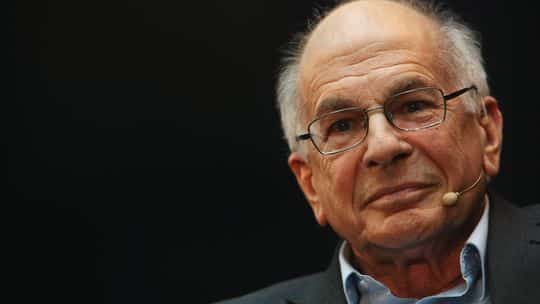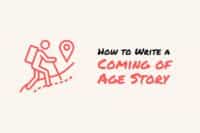I'm reading Nobel Prize winning Daniel Kahneman‘s groundbreaking book Thinking Fast and Slow.
What does a celebrated psychologist turned economist have to say about creative writing (besides the fact that his step-daughter is the fiction editor at the New Yorker)? A lot. The lessons I'm learning from Thinking Fast and Slow are transforming the way I write, and I think they will help you, too.

Kahneman's ideas aren't new. Last week, I shared the best quotes from Ernest Hemingway about writing, who said he never thought about his writing after he finished for the day because he didn't want “think his story out and lose it.” Fascinatingly, this insight has been confirmed by modern research
Two Ways to Think: System 1 and System 2
Much of Kahneman's book deals with two different systems in your brain for thinking. System 1 controls your subconscious, and it has more power over your daily decisions than you probably realize. System 1 is fast, making split second decisions that may or may not be accurate.
System 2, on the other hand, represents your conscious thought. For example, what is the solution to this math problem: 17 x 24?
Kahneman says that as you calculated the answer, your pupils dilated, your blood pressure went up, and your muscles tensed. Your conscious mind was straining to work on the solution (it's 408), and until you solved the problem or gave up, your body would continue to stay in stress.
System 1 is More Creative, System 2 is Better for Problem Solving
Creativity is about bringing several different ideas into a single thought, and this is where System 1 thrives. While System 2 is a focused, precise engineer, solving any problem set before her, System 1 is a fun, spontaneous artist splashing paint on the walls and making messes.
Writers often try to write like they're solving a math problem: “Act 1 must have the inciting incident; this scene doesn't have a turning point; what's the correct point-of-view for this novel.” When you get stuck thinking like an engineer as you write, writer's block tends to follow. You start focusing in on everything that's wrong with your writing until you're exhausted.
Instead, let each system do what it does best. Keep System 2 out of the writing room, which can be reserved for making messes. Then bring System 2 back in for cleanup.
Because it turns out that System 2 is a much better editor than System 1. It will spot your typos and errors in logic. It will clean up your copy and make sure your writing is readable. System 2 may not be very creative, but it will certainly keep you from looking like a fool.
5 Tips to Stay in System 1 While You Write
Personally, I have a hard time following this advice though. I tend to easily fall into System 2 when I write, and it often makes me a painfully slow writer.
How do you stay in System 1 even when your body is telling you there's something wrong, that you should quit writing and focus on editing? Here are five tips:
1. Smile
When you're happy, you're more likely to be in System 1. If you're sad, on the other hand, you're likely to switch into System 2.
Thus, monitor your mood as you write. Don't let yourself get frustrated when things aren't going well.
For a surefire trick, smile as you write. Smiling has been shown to change your mood to make you happier. Try it when you write today. It's fun!
2. Write What You Know
We often overuse or misinterpret this advice, but there is wisdom to writing what you know. Hemingway said:
I decided that I would write one story about each thing that I knew about…. What did I know best that I had not written about and lost? What did I know about truly and care for the most?
To keep yourself from overthinking and moving into System 2, write about something you know so well that it's effortless, something you've experienced so completely you don't have to think about.
This way, instead of having to recreate the experience in your head, you'll just be letting it flow from your body, almost like muscle memory.
3. Keep Your Pen Moving
When you stop writing you risk the chance of System 2 taking over. Don't stop. One of my favorite quotes about writing comes from the movie Finding Forrester:
No thinking. That comes later. You must write your first draft with your heart. You rewrite with your head. The first key to writing is to write, not to think!
And then a little later:
*Punch* the keys, for God's sake!
The rhythm of your typing will create its own flow and soon you won't be thinking about what you're writing, you'll just be writing.
4. Don't Overthink
In another quote in A Moveable Feast, Hemingway says:
When I was writing, it was necessary for me to read after I had written. If you kept thinking about it, you would lose the thing that you were writing before you could go on with it the next day.
Try this: when you finish writing for the day, don't allow yourself to think about your story. Anytime you feel your mind begin to think about your story, distract it with something else.
The next day, go back to the story you were working on. How does it feel? Is your writing more fresh? Are you ready to work on it now?
5. Find Your Writing Workspace
Philip Pullman, author of the His Dark Materials Trilogy, thanked an art museum in his hometown in the acknowledgments of one of his books. When he got really stuck in his novels, he said, he would go write in their café, claiming that all his plot snarls would go away within an hour.
We've written about the importance of your writing workspace on The Write Practice before, but it bears repeating here. System 1 thrives when it feels comfortable and happy. Put yourself in a place where your imagination can stretch its legs.
Write Fast, Edit Slow
In the end, you need both System 1 and System 2 to be a great writer. System 1 helps you create imaginative (but very rough) drafts. System 2 turns those rough drafts into great manuscripts.
The first step is to learn to identify when you're thinking in System 1 and System 2, and then try to move yourself into the one most suitable for the task at hand. Sometimes, this is impossible. You may find yourself stuck in System 1, checking Facebook and unable to focus when you should be editing. Or you may find that System 2 is blocking you from writing and being creative.
Hopefully, with practice, you can learn to steer your mind to be the most productive for your writing.
How about you? Do you spend more time writing in System 1 or System 2?
PRACTICE
Free write for fifteen minutes using the words orange, sweat, coin, and elm.
As you write, try to stay in System 1 using the tips above. When your time is up, edit your writing using System 2 (try frowning while you do it!). Then, post your practice in the comments section. And if you post, give feedback to your fellow writers.
Happy writing!







Orange, Sweat, Coin and Elm.
An unlikely bunch sweated there way down Elm Street. Their bright orange safety vests glared in the rising midday sun. All for a cause of course. Raising awareness of men’s cancer. Behind them a big white support van trundled along collecting the coins that have been thrown in to the collection tins left at haphazard markers around the city square.
“Hey Jeff.” Big Tom called to his co-driver “Check this one out.” He held a large hexagonal silver coin aloft to glint in the sunlight. Jeff peered out of the window wiped the sweat dripping off his brow and smiled.
“Looks like a foreign one to me mate.” He grinned and turned back to look at the road ahead.
The bustle of hairy legged, orange vested runners had stopped at the T-junction to sign cards and slurp up the juice from cut oranges and watermelon.
“Who would’ve of thought a bunch of unfit hairy ol’ middle aged an cloud look so cute?” Big Tom laughed as he stooped to collect another collection can from a bench beneath a shadowy elm tree.
He’d been diagnosed 3 Months ago with lung cancer. He was over-whELMed with the way his work buddies from the local council had rallied together and decided to undertake fundraising to assist his medical bills.
Two small beads of sweat stung his eye and rolled in unison with tears onto his rosey sweaty cheeks. He wasn’t the type to cry he reminded himself as he wiped the salty drops away. He popped the foreign coin in his vest pocket. A good luck charm he thought, as he caught up with the orange throng of Merry men on the corner.
Orange, Sweat, Coin and Elm.
An unlikely bunch sweated there way down Elm Street. Their bright orange safety vests glared in the rising midday sun. All for a cause of course. Raising awareness of men’s cancer. Behind them a big white support van trundled along collecting the coins that have been thrown in to the collection tins left at haphazard markers around the city square.
“Hey Jeff.” Big Tom called to his co-driver “Check this one out.” He held a large hexagonal silver coin aloft to glint in the sunlight. Jeff peered out of the window wiped the sweat dripping off his brow and smiled.
“Looks like a foreign one to me mate.” He grinned and turned back to look at the road ahead.
The bustle of hairy legged, orange vested runners had stopped at the T-junction to sign cards and slurp up the juice from cut oranges and watermelon.
“Who would’ve of thought a bunch of unfit hairy ol’ middle aged men could look so cute?” Big Tom laughed as he stooped to collect another collection can from a bench beneath a shadowy elm tree.
He’d been diagnosed 3 Months ago with lung cancer. He was over-whELMed with the way his work buddies from the local council had rallied together and decided to undertake fundraising to assist his medical bills.
Two small beads of sweat stung his eye and rolled in unison with tears onto his rosey sweaty cheeks. He wasn’t the type to cry he reminded himself as he wiped the salty drops away. He popped the foreign coin in his vest pocket. A good luck charm he thought, as he caught up with the orange throng of Merry men on the corner.
I loved how you used the words. I cared about the story and the characters.
Thanks Eliese, I stuck with 15 minutes and no editing.
Now I want to go back and edit mistakes, add some citric acid metaphor and twist leafy elm into an analogy of life: trees as lungs waxing to the sky before waning in their final flutter back into the earth.
I think I need a good 30 minutes before the prose and poetry begins to bite. 🙂
Wow that sounds beautiful too! I did 15 min of writing with frowning editing, but still want to change things too lol. It is a writers destiny I guess. Your story is still lovely without the edits.
I love this! I love the feeling and moment when the rhythm of typing takes over and we are finally writing. I have found it is easier to access this place when I practice accessing system 1 thinking throughout the day. Maybe that’s through mindfulness, or spontaneous doodling or writing on a napkin 🙂 Small practices add up and allow us to more easily get in the flow.
The silver coin is placed heads up on each of the closed, sunken eyelids. His black hair lays in a halo around his handsome face. It is because of his traitorous wife that he lays unmoving on the wooden bed. He was too young to die.
I should have been his bride. I loved him from the moment I saw him dressed in full gleaming body armor. He was dashing, kind and wealthy, but already betrothed to another. I watched him live his life from afar. He had a beautiful child, a nice home, and when the fighting began he became a hero. His life should have ended on the battle field instead of the kitchen floor with poison cursing through his veins.
I stand on the fringe of the crowd watching men set fire to the elm wondering if he would still be alive had we met first. Would he have held and caressed me? Would we now have a perfect toddling son? My heart aches for the lost dreams that will never be.
The spark turns to flame. The blaze grows and consumes the remnants of a life. The orange glow lights up the night’s sky as the mourners begin to disperse. Soon I am left alone with the roaring inferno. I approach until the temperature overwhelms my body, making me sweat. The fire is only a foot away. I wince in pain as the heat burns my face, but I want to be near to him one last time. I step closer and stare into the searing light searching for something left of him, but there is nothing. He is gone.
“Good bye.” I whisper.
Oh such sadness and longing.
What if? What if?
Well done – 15 minutes of meandering with only four words as your companion, into a tale of unrequited love and bitter loss. Bravo.
😀 Thanks!
When I started writing, I would try to balance the two systems. More and more, I would veer toward System 2, especially when I typed drafts. It was cumbersome trying to edit while typing drafts and nothing would be accomplished. Nowadays, when I sit with pen and paper, I can let System 1 do its job and create freely. I found that changing the way I wrote drafts allowed me to be more creative.
My editor friend recommended I read this. I am shifting from daily devotional and concise general article writing to my first novel. The transition has been very enlightening. What I learned is I am a system2 by nature as well, but find my story development best flows when I am in System 1 “free-flow”. Reading this reminds me that 1 always should precede 2! But it follows close behind to clean up what 1 freely let onto the page. I tend to write a scene or commentary of thought spontaneously, writing as my mind flows through my fingers type the words…then I go back and my eyes and my mind become the audience to read what I wrote to tighten up my thoughts and words that fell onto the page. But as I have said in the beginning I have an editor friend to make sure my 1+2=3!
Hi Joe
Great post. I’m happy to say i spend most of my time in System 1. I think this is one place where pantsers can find things easier than planners. When I begin a book, i will sit down and type a sentence.
After a few of them, I’ll have the beginnings of a character.
Then something will happen to that character, some conflict that helps me learn a little more about him. And so on. Throughout this process, I’m in system 1, not thinking beyond the next line, and grinning all the way 🙂
I believe our subconscious takes care of a lot of stuff we could worry about if we chose, but probably don’t need to. I’ve written at least two huge twists in my books, only realising what i was doing at the last second, but then looked back and realised that everything up to that point led neatly to the twist!
cheers
Mike
Thanks Michael. I think you’re probably right. I do think you can certainly plan while being in system 1, but freewriting (or writing loosely but with intention) certainly lends itself better to System 1.
That’s so cool to hear that your System 1 brought out those twists!
Great post Joe! I loved Kahneman’s book too. My System 1 and System 2 seem to fight it out a lot. I’m posting these tips in my workspace to remind me.
I have trouble with System 1 sneaking back into my editing process. My creative mind does not want to let go of the things my analytical mind wants to eliminate.
Approve.